What People Are Commenting
Kindergarten Papacy, First Protestant Pope
The First Protestant Pope
TIA,
I thought you would be interested in this commentary by Bill Tammeus, a Presbyterian elder and columnist for The Kansas City Star. Because Francis is “long on social justice concerns and short on respect for hierarchical governance structures and fancy ritual,” he appeals to Protestants, who also find common ground on his theological stands.
As Tammeus notes, “It now appears to many of us that the new pope is intent on moving the Catholic church a bit closer to the Protestant approach.”
Mark Stabinski
Pope Francis and His Protestant Views
I often tell people that if you lose your way in Reformed Tradition (read Presbyterian) theology, you can always go back to square one, which says, in essence, this: God is sovereign.
Or - in wording I prefer now because most of us have no experience living under a sovereign - God is gloriously free.
I thought about that the other day when I read something Pope Francis said in a book he co-authored in 2010 as Cardinal Jorge Mario Bergoglio. Speaking about how he would converse with an atheist, Bergoglio wrote: "I would not tell him that his life is condemned because I am convinced that I have no right to pass judgment."
That, friends, is Reformed Tradition theology {Presbyterianism]. It is up to God to determine who will have eternal life. It is not up to us. Even if you go to Reformed Tradition founder John Calvin's hard-to-follow concepts about predestination (to say nothing of double predestination), you discover that no human being can know for certain who is saved and who is condemned.
This very point once led my friend Kathleen Norris to write this in her book Amazing Grace: A Vocabulary of Faith: "It strikes me that only a French lawyer could have come up with so complex, if not bizarre, a justification for treating all people as if they could be among the elect, the chosen of God."
She's right. Even if you buy Calvinism's some-get-saved, some-get-damned-and-there's-nothing-you-can-do-about-it scheme, you don't know who is whom, so you have to be nice to everyone on the theory that you may spend eternity with that person.
Which is pretty much what Bergoglio was saying in On Heaven and Earth, co-written with Rabbi Abraham Skorka.
When I read what Bergoglio said on this subject, I had a provocative thought that I was tempted to throw into the lede of this column. Something like this: "Hey, Catholics: Do you know what you've done? You've chosen a Protestant pope."
But the day after I read the pope's words, I discovered that someone had beat me to that conclusion. Writer Jonathan Merritt asked this question about Pope Francis in this Religion News Service piece: "... could the growing popularity (of Francis) among non-Catholics make him 'the first Protestant Pope?' "
Merritt added this: "The combination of the new Pope's concern for justice issues and his conservative theology seems to be appealing to many of these socially conscious Protestants." (I like what Merritt said, though I'm not happy he got the idea that Francis may be the first Protestant pope into print before I did. But let it go.)
Those of us in mainline Protestant churches (Presbyterians, Methodists, Lutherans, etc.) have been long on social justice concerns and short on respect for hierarchical governance structures and fancy ritual.
We pay a price for this emphasis, but it's one we've been willing to pay. And it now appears to many of us that the new pope is intent on moving the Catholic church a bit closer to this Protestant approach.
Perhaps we could meet in the middle. We Protestants will add more ritual and you Catholics can decentralize your governance structure as together we wash the feet of the poor.
I know that sounds a bit facetious, but I'm serious.
There is much we can learn from each other, and the learning of it might move us closer to some kind of reunification (at least of spirit) nearly 500 years after Martin Luther nailed his 95 theses to the cathedral door, thus (inadvertently) starting the Protestant Reformation.
We Protestants don't have our own pope to negotiate a grand bargain with Francis, but if he's really the first Protestant pope, problem solved. All we Protestants and you Catholics need to do to start is pay attention to the times he's standing on our common ground and join him there. (original here)
I thought you would be interested in this commentary by Bill Tammeus, a Presbyterian elder and columnist for The Kansas City Star. Because Francis is “long on social justice concerns and short on respect for hierarchical governance structures and fancy ritual,” he appeals to Protestants, who also find common ground on his theological stands.
As Tammeus notes, “It now appears to many of us that the new pope is intent on moving the Catholic church a bit closer to the Protestant approach.”
Mark Stabinski
I often tell people that if you lose your way in Reformed Tradition (read Presbyterian) theology, you can always go back to square one, which says, in essence, this: God is sovereign.
Or - in wording I prefer now because most of us have no experience living under a sovereign - God is gloriously free.
I thought about that the other day when I read something Pope Francis said in a book he co-authored in 2010 as Cardinal Jorge Mario Bergoglio. Speaking about how he would converse with an atheist, Bergoglio wrote: "I would not tell him that his life is condemned because I am convinced that I have no right to pass judgment."
That, friends, is Reformed Tradition theology {Presbyterianism]. It is up to God to determine who will have eternal life. It is not up to us. Even if you go to Reformed Tradition founder John Calvin's hard-to-follow concepts about predestination (to say nothing of double predestination), you discover that no human being can know for certain who is saved and who is condemned.
This very point once led my friend Kathleen Norris to write this in her book Amazing Grace: A Vocabulary of Faith: "It strikes me that only a French lawyer could have come up with so complex, if not bizarre, a justification for treating all people as if they could be among the elect, the chosen of God."
She's right. Even if you buy Calvinism's some-get-saved, some-get-damned-and-there's-nothing-you-can-do-about-it scheme, you don't know who is whom, so you have to be nice to everyone on the theory that you may spend eternity with that person.
Which is pretty much what Bergoglio was saying in On Heaven and Earth, co-written with Rabbi Abraham Skorka.
When I read what Bergoglio said on this subject, I had a provocative thought that I was tempted to throw into the lede of this column. Something like this: "Hey, Catholics: Do you know what you've done? You've chosen a Protestant pope."
But the day after I read the pope's words, I discovered that someone had beat me to that conclusion. Writer Jonathan Merritt asked this question about Pope Francis in this Religion News Service piece: "... could the growing popularity (of Francis) among non-Catholics make him 'the first Protestant Pope?' "
Merritt added this: "The combination of the new Pope's concern for justice issues and his conservative theology seems to be appealing to many of these socially conscious Protestants." (I like what Merritt said, though I'm not happy he got the idea that Francis may be the first Protestant pope into print before I did. But let it go.)
Those of us in mainline Protestant churches (Presbyterians, Methodists, Lutherans, etc.) have been long on social justice concerns and short on respect for hierarchical governance structures and fancy ritual.
We pay a price for this emphasis, but it's one we've been willing to pay. And it now appears to many of us that the new pope is intent on moving the Catholic church a bit closer to this Protestant approach.
Perhaps we could meet in the middle. We Protestants will add more ritual and you Catholics can decentralize your governance structure as together we wash the feet of the poor.
I know that sounds a bit facetious, but I'm serious.
There is much we can learn from each other, and the learning of it might move us closer to some kind of reunification (at least of spirit) nearly 500 years after Martin Luther nailed his 95 theses to the cathedral door, thus (inadvertently) starting the Protestant Reformation.
We Protestants don't have our own pope to negotiate a grand bargain with Francis, but if he's really the first Protestant pope, problem solved. All we Protestants and you Catholics need to do to start is pay attention to the times he's standing on our common ground and join him there. (original here)

Posted May 30, 2013
______________________
The opinions expressed in this section - What People Are Commenting - do not necessarily express those of TIA











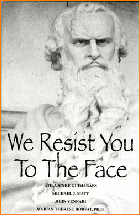
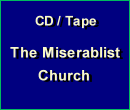
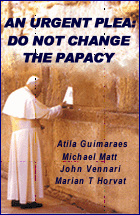
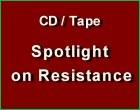
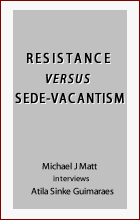
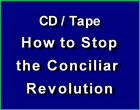
Look at this comment on the general line of Pope Francis' pontificate, taken from a blog I recently discovered, "Mundabor," which states my beliefs pretty well.
Patrick O'Brien
I do not know you, but I think that the shallowness of this Pope is getting seriously embarrassing. This, if we charitably assume that the Pope is being merely unintentionally shallow rather than willfully disingenuous. As one tries to be charitable, particularly concerning the Holy Father, I suggest we assume the first, but never become blind to the possibility of the second.
“Nessuno deve uccidere in nome di Dio” [No one can kill in the name of God] and “anche soltanto dirlo e' una bestemmia” [just to say it is a blasphemy], the Pope has declared in one of his rather spontaneous sermons. Now, in Italian “uccidere” is in common parlance used both for killing and for murder, and the context tells you which is which, though if you mean “murder” you may well use unambiguous words like “assassinare”.
Therefore, the words of the Pope can be interpreted in an orthodox way (“No one can commit a murder in the name of God, and even to say so is blasphemy”; I certainly can't hack a man to pieces with a meat cleaver in the name of God), but it can also be understood in the “spirit of Vatican II”, pacifist way of “no one can wage war in the name of God, and even to say so is a blasphemy”; negative implications for the capital punishment can be drawn in exactly the same way.
Now, has the Pope said countless saints of the past (think of St. Bernard of Clairvaux, the real engine beside the promotion of the Second Crusade; or even St. Francis, another great friend of the Crusades, to mention just two) were blasphemous, together with all those men who risked or gave their lives in battle for Christ? No, he didn't say so and, if confronted with the thoughtless shallowness of his own words, he would certainly deny it.
Still, this is the way everyone who so desires will be able to understand the Pope's words, and there is no denying that the constant desire for popularity coming from the Vatican media outlets took care that this is the case.
Now, whenever the Pope makes such affirmations, we are not given the full text of the homily, possibly because of the inordinate rambling therein contained; but as the Pope allows this to happen, and allows the Vatican Radio to publish the “convenient” and “savory” snippets of his sermons, he must be held responsible for the consequences of their posturing and cheap marketing.
Therefore, either the Pope knows better, but willfully sows these kindergarten banalities in order to become popular among the ignorant and the stupid (we do not want to think that, if we can); Or, more probably and more charitably, he is a man of such little depth that whenever he talks in public he utters every thought that comes to his mind without reflecting on the implications, and without any concern for the way his words will be interpreted; what this also tells us about his well-publicized humility. I will leave it for you to decide.
This Pope has been compared to a country priest. Frankly, I think we have the right to expect better than that from a country priest, too. But at least the country priest doesn't have the Vatican Radio website to divulge urbi et orbi whatever is produced by his “streams of consciousness”.
My suggestion is that the Vatican Radio website either ignores the Pope's homilies or publishes them in their entirety. But the best solution would be that the Holy Father starts to understand what his role entails and to read homilies carefully prepared (possibly not by him, or reviewed by a sound theologian) beforehand, so that both theological nonsense and ambiguities are avoided.
This Papacy is becoming a kindergarten. The Pope seems not displeased.
Mundabor